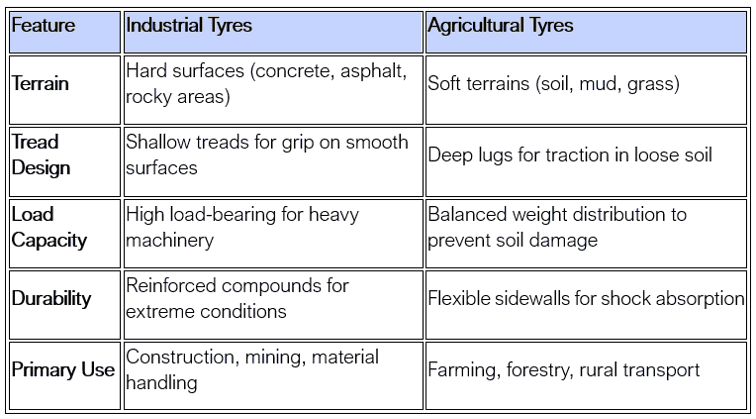ceat-speciality:blogs-tags/all,ceat-speciality:blogs-tags/tyre-advice
Industrial vs. Agricultural Tyres: Key Differences and Choosing the Right Fit
Mon, 9 Jun 2025 | PRODUCTS
Search Further
ceat-speciality:blogs-tags/all,ceat-speciality:blogs-tags/tyre-advice
Mon, 9 Jun 2025 | PRODUCTS
Tyres play a crucial role in the performance and efficiency of heavy-duty machinery, whether in agriculture or industry. Choosing the right tyre type can significantly impact productivity, safety, and cost-effectiveness. While industrial tyres and agricultural tyres may seem similar, they are designed for distinct applications, each catering to specific terrains, load capacities, and durability requirements.
Understanding the differences between these tyres is essential for selecting the right fit for your machinery. In this blog, we explore the key distinctions between industrial and agricultural tyres, their applications, and how to make an informed choice.
Understanding Industrial Tyres
Industrial tyres are engineered for heavy-duty applications in construction, mining, warehousing, and material handling. These tyres are built to withstand harsh environments, offering superior durability and stability on hard surfaces like concrete, asphalt, and rocky terrains.
Key Features of Industrial Tyres
✅ Robust Construction: Industrial tyres are made with reinforced compounds to endure extreme loads and resist punctures.
✅ Optimised Tread Patterns: Designed for traction on hard surfaces, industrial tyres feature shallower treads for better grip on concrete and asphalt.
✅ High Load-Bearing Capacity: These tyres support substantial weight, making them ideal for forklifts, loaders, and cranes.
✅ Durability & Longevity: Industrial tyres are built to last, reducing downtime and maintenance costs.
Applications of Industrial Tyres
Industrial tyres are commonly used in:
Understanding Agricultural Tyres
Agricultural tyres are specifically designed for farming and rural applications, ensuring optimal performance on soft, uneven terrains like soil, mud, and grass. These tyres prioritize traction, flotation, and soil protection, making them essential for tractors, harvesters, and sprayers.
Key Features of Agricultural Tyres
✅ Deep Tread Patterns: Agricultural tyres have aggressive lugs for maximum grip in muddy and loose soil conditions.
✅ Low Ground Pressure: Designed to minimize soil compaction, preserving crop health and productivity.
✅ Flexible Sidewalls: Allow better shock absorption and adaptability to uneven terrains.
✅ Weather Resistance: Built to withstand varying weather conditions, ensuring longevity in farming environments.
Applications of Agricultural Tyres
Agricultural tyres are commonly used in:
Key Differences Between Industrial and Agricultural Tyres

Choosing the Right Tyre for Your Needs
Selecting the right tyre depends on your specific application, terrain, and machinery requirements. Here’s how to make an informed choice:
1. Assess Your Terrain
- If your machinery operates on hard surfaces, industrial tyres are the best fit.
- If you work in fields or muddy areas, agricultural tyres provide better traction and soil protection.
2. Consider Load Requirements
- Industrial tyres are built for heavy loads, making them ideal for construction and mining.
- Agricultural tyres distribute weight evenly to prevent soil compaction, ensuring better crop growth.
3. Evaluate Durability Needs
- Industrial tyres offer puncture resistance and long-lasting performance in extreme conditions.
- Agricultural tyres provide shock absorption and weather resistance for farming applications.
4. Optimise for Efficiency
- Industrial tyres enhance stability on smooth surfaces.
- Agricultural tyres improve traction and flotation, reducing fuel consumption in farming operations.
CEAT Specialty: Your Trusted Tyre Partner
At CEAT Specialty, we understand the importance of choosing the right tyre for your industry. Our industrial and agricultural tyres are designed with advanced technology to ensure durability, efficiency, and superior performance.
✅ Industrial Tyres: Engineered for heavy-duty applications, offering stability and longevity.
✅ Agricultural Tyres: Designed for farming needs, ensuring soil protection and optimal traction.
Conclusion: Making the Right Choice
Whether you need industrial tyres for construction or agricultural tyres for farming, selecting the right fit is crucial for maximising efficiency and reducing operational costs. By understanding the key differences and assessing your specific needs, you can make an informed decision that enhances productivity and longevity.
Looking for high-quality tyres for your machinery? Explore CEAT Specialty’s range of industrial and agricultural tyres today!
Have Questions Related to CEAT Specialty Tyres?
Design focus industrial for durability, agricultural for traction.
No, industrial tyres handle heavier loads and rough surfaces better.
Agricultural tyres have deeper lugs; industrial tyres have flatter tread.
Yes, it leads to faster wear and reduced efficiency.
Based on terrain, load, and application needs.